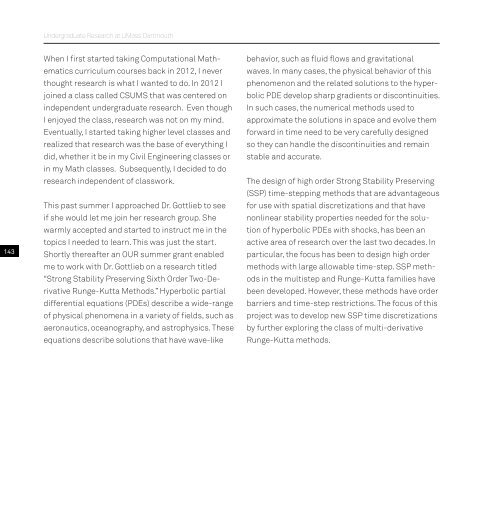Undergrad_Book_16-18_Pge_View_Print_no print marks_compressed
Create successful ePaper yourself
Turn your PDF publications into a flip-book with our unique Google optimized e-Paper software.
<strong>Undergrad</strong>uate Research at UMass Dartmouth<br />
143<br />
When I first started taking Computational Mathematics<br />
curriculum courses back in 2012, I never<br />
thought research is what I wanted to do. In 2012 I<br />
joined a class called CSUMS that was centered on<br />
independent undergraduate research. Even though<br />
I enjoyed the class, research was <strong>no</strong>t on my mind.<br />
Eventually, I started taking higher level classes and<br />
realized that research was the base of everything I<br />
did, whether it be in my Civil Engineering classes or<br />
in my Math classes. Subsequently, I decided to do<br />
research independent of classwork.<br />
This past summer I approached Dr. Gottlieb to see<br />
if she would let me join her research group. She<br />
warmly accepted and started to instruct me in the<br />
topics I needed to learn. This was just the start.<br />
Shortly thereafter an OUR summer grant enabled<br />
me to work with Dr. Gottlieb on a research titled<br />
“Strong Stability Preserving Sixth Order Two-Derivative<br />
Runge-Kutta Methods.” Hyperbolic partial<br />
differential equations (PDEs) describe a wide-range<br />
of physical phe<strong>no</strong>mena in a variety of fields, such as<br />
aeronautics, ocea<strong>no</strong>graphy, and astrophysics. These<br />
equations describe solutions that have wave-like<br />
behavior, such as fluid flows and gravitational<br />
waves. In many cases, the physical behavior of this<br />
phe<strong>no</strong>me<strong>no</strong>n and the related solutions to the hyperbolic<br />
PDE develop sharp gradients or discontinuities.<br />
In such cases, the numerical methods used to<br />
approximate the solutions in space and evolve them<br />
forward in time need to be very carefully designed<br />
so they can handle the discontinuities and remain<br />
stable and accurate.<br />
The design of high order Strong Stability Preserving<br />
(SSP) time-stepping methods that are advantageous<br />
for use with spatial discretizations and that have<br />
<strong>no</strong>nlinear stability properties needed for the solution<br />
of hyperbolic PDEs with shocks, has been an<br />
active area of research over the last two decades. In<br />
particular, the focus has been to design high order<br />
methods with large allowable time-step. SSP methods<br />
in the multistep and Runge-Kutta families have<br />
been developed. However, these methods have order<br />
barriers and time-step restrictions. The focus of this<br />
project was to develop new SSP time discretizations<br />
by further exploring the class of multi-derivative<br />
Runge-Kutta methods.



